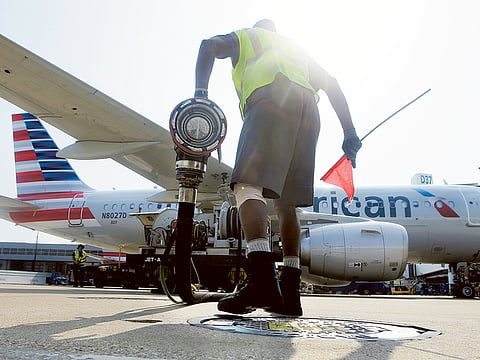Route to cleaner jet fuels is not via higher air ticket charges
Airlines are making such a switch, but costs will be prohibitive initially

Just last week, Dubai International Airport celebrated its 60th anniversary, marking its development from a sand runway to becoming the world’s busiest - a feat first reached in 2014 and repeated each year since. And despite the pandemic having caused unprecedented demand destruction, the aviation sector remains deeply committed to investing in sustainability in the near term, before new electric aircraft technologies or zero-carbon fuels come on stream.
Jet fuel – once the star product for Europe, Middle East and Africa refiners – has been under severe pressure, touching the lowest value in 22 years on April 27, when the Platts benchmark CIF Northwest Europe jet fuel cargo market was assessed at $111/mt. This followed the travel restrictions over the COVID-19 outbreak and which devastated demand.
The Platts Arab Gulf jet fuel assessment, which is used daily across the Middle East for the pricing of jet fuel on thousands of flights, was assessed at $40.81/b on October 7, having recovered somewhat from a record low of $5.06/b on April 22 this year.
A long road to recovery
But while travel restrictions around the world have subsequently moderated, flight capacity is showing little sign of recovery, and is now only 51 per cent of the level at this point last year, according to industry association IATA. Platts Analytics forecasts a 35 per cent reduction in global jet fuel consumption this year, and doesn’t expect a path to recovery until mid-decade, though still remaining below levels of recent years.
Against this backdrop, and with the energy transition moving more into focus, sustainability remains at the top of the agenda for airlines. Indeed, IATA believes the key to the aviation sector combatting climate change is making investments in carbon offsetting, sustainable fuels and green technologies – and not taxes, which it has said will prevent a return of passengers.
The Airports Council International argues that the industry needs to invest in a green recovery to lay the foundations for a prosperous and sustainable industry in the long-term.
Just 12 years ago the first test flight by a major airline, Virgin Atlantic, took to the skies using biojet, a blend of coconut and babassu oil that made up 20 per cent of the fuel used by one of its engines. Since then, various sustainable aviation fuel (SAF) blends made from such diverse things as algae, used cooking oil and animal fat have been used in 250,000 flights globally.
Small matter of cost
For context, though, that represents only two days’ worth of jet fuel used globally in pre-COVID-19 times. And new Platts SAF prices show that it costs around five times more than conventional jet fuel, highlighting that SAF is nowhere near competitive on its own.
Nonetheless, an increasing number of airlines have made forward-looking commitments to decarbonize and an emerging pathway involves the integration of SAF into supply chains. While there are only seven airports across the EMEA region taking active deliveries of SAF, an equal number have signed on to accept batch deliveries from pilot SAF production facilities, primarily in Scandinavia.
Emirates announced at the start of this month that nearly a third of its dedicated fleet of transport buses for cabin crew will now operate on biofuel, taking another step forward on the airline’s environmental mission to reduce emissions. The contracted service provider, Al Wegdaniyah, has committed to operating all road trips with biodiesel provided by Neutral Fuels, one of the UAE’s leading producers of biofuels, utilizing locally sourced, used cooking oil as feedstock.
Just as Dubai international airport rose from being a sand runway in the desert to an international aviation hub that has served more than 1.115 billion passengers in its 60-year existence, the aviation industry has ambitious plans to adapt despite the challenges presented by the global pandemic. However, the progress of sustainable aviation will depend on government policy mandates or incentives to encourage greater adoption if consumers – when they start flying again – are not prepared to pay the additional costs for cleaner fuel.
Dan Colover is Head of Structured Market Engagement - Middle East, S&P Global Platts.
Sign up for the Daily Briefing
Get the latest news and updates straight to your inbox






